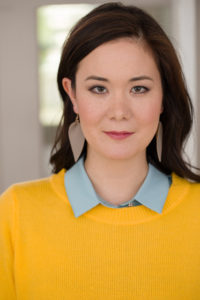Playwright Q & A with Keiko Green

Cygnet is pleased to present the world premiere of Sharon to its audiences this summer! Get insight into this witty thriller from playwright Keiko Green.
Q: What experience do you hope audiences will have when they see Sharon?
A: My plays are always driven by a theme, or as my mentor at UCSD Naomi Iizuka would call it, “an existential question.” Sharon is technically a play about gentrification, power imbalances, about growing up in a toxic home — but it was driven by the question: “What will we do to survive?” Sharon is a darkly comedic psychological thriller. The play is rooted in emotional twists and turns that will hopefully stun audiences with an unforgettable final scene that flips back and forth between hilarious and unnerving.
Q: What was your inspiration for writing this play?
A: There was a point a few years ago that I got really sick of watching stories about rich New Yorkers (with the exception of Succession, of course — I’m no monster). During lockdown, I understood how stories about rich people traveling the world, dealing with first world problems like fashion and inheritance was scratching an escapist itch, but after being stuck within the same small room day after day, working in what seemed like a dead industry, I started to feel like I was losing my mind. I decided to write a play about people who were poor, who were barely scraping by in a town that was left behind by Seattle’s tech boom. The first three scenelets were written as I explored my version of a transactional relationship, and a challenge presented itself: how can I flip these positions of power? I had to unearth the complex experiences that turned the protagonist into what he is and find empathy for someone I didn’t initially connect with.
Q: You’re actually IN the play – what are you most looking forward to (or nervous about) stepping into the role of Tina?
A: I haven’t been in one of my own plays since we were building sets out of cardboard, putting up productions for $3,000! I’m very excited. I pride myself on writing actor-forward plays, in which characters really want something from each other and really want to change each other. I’m also very nervous — I work with my trusted directors to build rooms that don’t have that hierarchical structure that I think can actually be so harmful to an artistic process. In a play about power, here comes the playwright acting opposite Raf in a semi-romantic scene. Luckily, we’ve put together a really incredible cast and crew that I’m personally intimidated and wow-ed by on a regular basis. I feel confident that the final product will be due to the collaboration of everyone in the room, something we can all feel ownership over.
Q: This is your second World Premiere in 2023! How is Sharon the same (and different) from your first World Premiere Exotic Deadly: Or, the MSG Play?
A: For people that saw Exotic Deadly over at the Old Globe, they might be surprised to see this darker side of my brain (though they’ll probably recognize its strangeness). This play isn’t about the Asian American experience, and though some characters might seem like they’re in a slightly heightened world, we’re not seeing things from the perspective of an unreliable, semi-manic 14 year-old perspective. Sharon isn’t cute or pretty or flashy — the walls are falling apart, the characters are desperate, it’s much more adult. But ultimately I have a love for my protagonists, even the ones that seem kind of scary at first. I think that’s the feminine part of my writing. I adore my characters, and I want to be tender with them. And though Sharon isn’t a straight comedy like Exotic Deadly, humor is an intrinsic part of my writing.
Q: Cygnet audiences first saw Sharon during it’s reading at The Bill and Judy Garrett Finish Line. What was that process like and how has the script evolved since then? Any new perspectives on the work?
A: The Bill and Judy Finish Line Commission was an incredible opportunity. I truly didn’t know whether the play was working at all until we worked on it, found the emotional and story holes. The workshop made me fall in love with the play. The biggest eye-openers since then have been through the casting process — we’re making some changes, opening the world up based on people we want to have in the room. It was great to realize that we could build something based on who understands the strange tone of the play instead of forcing people in based on arbitrary ideas of race/age/gender.
Q: You’ll be on stage once again with your husband MJ Seiber, who plays Gregg. How is working alongside your partner?
A: MJ and I met doing a production of Stupid F@#$ing Bird at ACT in Seattle. We’ve also performed in Midsummer, Beatrice and Benedick in Much Ado, and just recently got to work on God of Carnage with Backyard Renaissance. We work great together. On the writing side, consider him an uncredited consultant on all my projects. This will be the first time he’s acting in something that I wrote, so that’s an adventure that I’m looking forward to. He’s an amazing actor whose instincts are almost never wrong, and he’s going to be hysterical as Gregg.
Raf and I went to undergrad together, and reconnected during the workshop. I know Kat from grad school. Robby directed me in the Great Leap and God of Carnage and has become a great friend. It’s a dream to get to build a room full of people I respect from different stages of my life. I can’t wait to show everyone what we’ve created!